I receive requests for information about myself from readers and particularly from students who are writing about my poems. This is an attempt to supply the sort of information that is not available in a CV or resume.
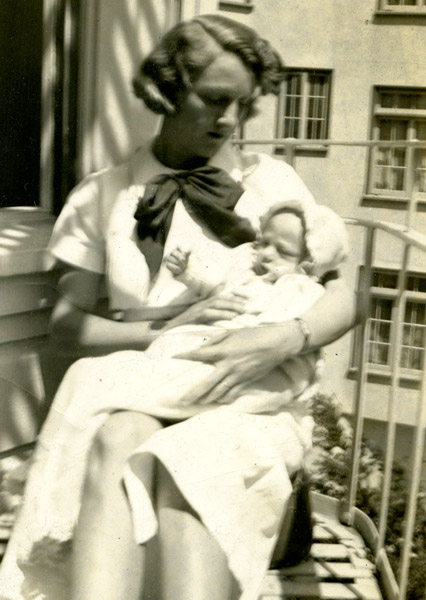 I was born in San Francisco on January 7, 1935. My mother, Frances Hayden, and my father, Howard Johnson Abbott, had been married for over ten years, and my sister, Nancy Hayden, had been born on April 2, 1926. That she was nine years older than me became very important later on.
I was born in San Francisco on January 7, 1935. My mother, Frances Hayden, and my father, Howard Johnson Abbott, had been married for over ten years, and my sister, Nancy Hayden, had been born on April 2, 1926. That she was nine years older than me became very important later on.
During the summer after I was born, my mother took my sister and me to New York by train, stopping in Minneapolis to visit my father’s parents, Howard Strickland and Mary Johnson Abbott. In New York she took up residence with her mother, Frances Stenersen. My grandmother had taken Hamilton Stenersen (known as Tony—actually Big Tony, since I was now little Tony) as her third husband at some point, and they lived in an apartment in Manhattan.
As a baby, I suffered from bilateral club feet, and a number of surgeries were required to remedy the problem, and throughout my early childhood I was very self-conscious about my feet and about not being able to walk or run like other children. I eventually got over it, but I still get asked frequently why I am limping. My poem called The Man Who Walks Funny, deals with that.
My mother divorced my father and married a lawyer from Mississippi named William R. Covington, whom I called Bill. We moved to Norwalk, Connecticut, where we lived in a series of houses, first in South Norwalk on the corner of Soundview and Highland Avenues, and then on Newtown Avenue in Norwalk. I have revisited those locations in recent years.
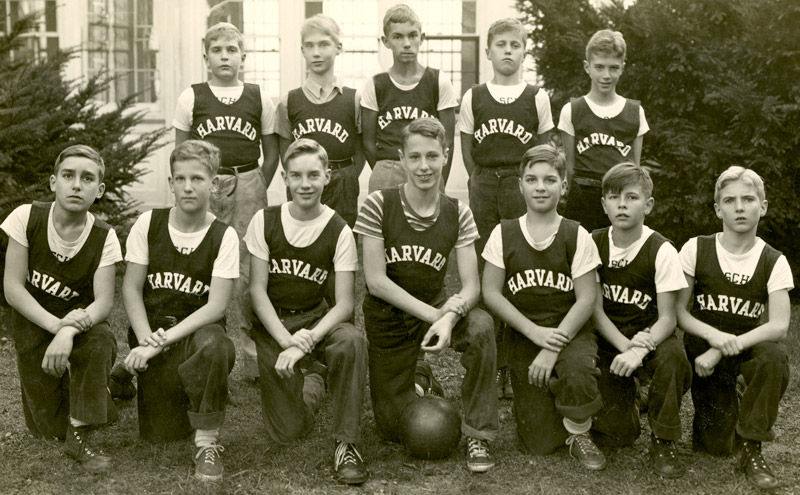 I liked school, and I did well in school. School was orderly, it was safe, and you knew what to expect and what was expected of you. Vacations were another matter. I seldom knew where I was going, who was going to take care of me, and what was going to happen next.
I liked school, and I did well in school. School was orderly, it was safe, and you knew what to expect and what was expected of you. Vacations were another matter. I seldom knew where I was going, who was going to take care of me, and what was going to happen next.
Sometimes I stayed with Bill in his apartment in Greenwich Village. Sometimes I stayed with my mother at the hotel on Madison Avenue and 92nd St. where she had gotten a job.
After my sister got married to Leonard C. Gordon, I stayed with them. I stayed with Warren and Gwenn Chapin in South Norwalk,–across the street from one of the houses in which we had lived. By the late ’40’s my father’s sister, Emily Abbott, had married the painter, B.J.O. Nordfeldt, and had moved to New Jersey from Minneapolis. After that I frequently stayed with them at their home outside Lambertville.
During the summer of my ninth year (1944) things began to get worse and worse in the family. My sister, now eighteen, graduated from high school, and I was sent off to a boys’ camp nearby (Camp Saugatuck). At the end of the summer Bill came to pick me up and announced that I was going to boarding school. My mother was sick, my sister, Nancy, had moved to New York to get a job, and the family home was gone. I was sent to the Fay School in Southborough, Massachusetts, where I remained for five years, graduating from Fay in 1949, in the eighth grade.
From time to time I visited my grandparents, the Stenersens, at places they had rented during the summer. And later, after my grandmother’s death, I stayed with Tony Stenersen at his apartment near Lexington and 48th St. I considered myself a New Yorker, because that was my base of operations, and I memorized every railroad station between Framingham, Mass. (Fay School) and New York City.
During my eleventh year (1947) I discovered that I was being sent to school by my godmother, Marion Somers Lowe, who had been my mother’s best friend in San Francisco. I did not know she existed, because she had kept herself out of the picture, preferring to work through family members, primarily Bill Covington. But when Bill left New York to begin a new life for himself and his new wife, Muriel, Marion Lowe had no choice but to come forward. But what she did was to engage my father, who had since remarried, to take care of me. So I was flown to San Francisco, to spend the summer with my father and stepmother, Helen Wolfe, at a ranch in the Sacramento Valley, not far from Marysville. My father and Helen had two children, Martha and Bill, and the summer was an awkward one for me because they were much younger, and I simply did not have enough to do. The following summer my father and Helen moved to Phoenix, Arizona, where I spent part of the summer. I was finally able to visit my godmother at her ranch just outside Santa Cruz, Cal., in a little community called Bonny Doon.
This period of my life, from 1944 to 1949, is the basis for my novel, Leaving Maggie Hope, which won the Novello Award for Literature and was published in the fall of 2003 by Novello Press of Charlotte.
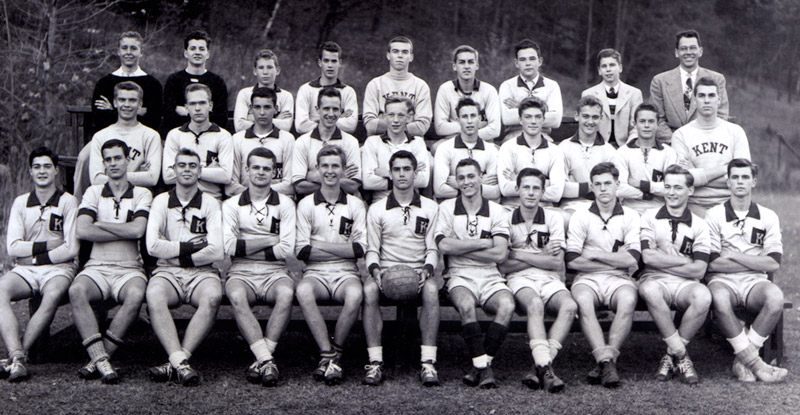 Between 1949 and 1953 I attended Kent School in Kent, Conn, in the northwest corner of the state, very close to both the New York and Massachusetts state lines. Our great rivals were Hotchkiss, Loomis, Taft, Choate, Berkshire and Trinity-Pawling. I loved Kent, and was active in soccer and wrestling as well as drama, debate, and journalism. I worked on the weekly newspaper, becoming Editor my senior year.
Between 1949 and 1953 I attended Kent School in Kent, Conn, in the northwest corner of the state, very close to both the New York and Massachusetts state lines. Our great rivals were Hotchkiss, Loomis, Taft, Choate, Berkshire and Trinity-Pawling. I loved Kent, and was active in soccer and wrestling as well as drama, debate, and journalism. I worked on the weekly newspaper, becoming Editor my senior year.
During my time at Kent both my mother and my grandmother died. They had been so symbiotic in life (my mother being an only child) that it seemed ironically fitting that one could not live without the other. Both of them had drinking problems, and both died finally from cancer, my mother first in December of 1950, and my grandmother soon after in early 1951 (these are guesses and may be wrong).
I didn’t pay much attention to their deaths at the time. I was growing more and more apart from the family, and loved my friends at school, their families, and their lifestyles. I wrote about this in my poem, ‘Dust Beneath my Shoe,’ in A Small Thing Like a Breath.
I graduated from Kent in 1953 and was privileged to spend a year in Europe, on an English Speaking Union Schoolboy Fellowship, at Uppingham School, one of the oldest of the British ‘public’ schools. I have a detailed diary that I have saved from my year at Uppingham and used it to help me with the final sections of The Three Great Secret Things, my second novel, which is drawn from my Kent School experience. Most of the characters in that novel are based on classmates and teachers at Kent, but the most important character in the novel, Tracy Warren, is not autobiographical at all. “Where did you find her?” my classmates ask. “In my imagination,” I answer.
In the fall of 1954 I became a sophomore at Princeton, and took some time to adjust. After the glories of Kent and Uppingham, at Princeton I was a nobody. I had never been a nobody before, so it took time to find a place and an identity there. I’m still working on that.
On January 7, 1954, the date of my twenty-first birthday, my sister, her husband, Lenny, and their two children, Sally and Chris, got in the car and drove to California. My last real contact with New York City was gone. I always stayed with them in New York in their apartment in the Bronx, not far from Yankee Stadium, and I considered that place home as much as any place. It was my legal address and the address I used when filling out forms. The move was very difficult for me, and when Christmas came, I just didn’t know what to do, so I went to California to be with Nancy and Len and the kids, because that was home, but Los Angeles (they lived in the ‘valley’ in North Hollywood) was not home. I spent more time with my aunt Emily in Lambertville. I had spent the summer of 1952 with her, working at a restaurant in nearby New Hope, just across the Delaware River, and the summer of 1953 I spent with my Kent friend, Bur Sienkiewicz, in Doylestown. From Bur I learned to drive a car, finally, at the age of seventeen, and got my license. My poem, “First Love”, in Yellow Raincoat comes from the summer of 1952.
When I graduated from Princeton, I was fortunate enough to win a Danforth Fellowship to go to Harvard Graduate School in English. I was going to be an English teacher; that was that. Of course, I had to teach, because school was the only thing I really knew anything about. I loved English, I loved to read, I loved to write, and I loved my teachers. My teachers had been my mentors, my models; at Fay, at Kent, and at Princeton, too many to mention here, and so to me the good life would be imitating them. If I hadn’t won the Danforth, I don’t know what I would have done. Marion Lowe had released me; she sent me through college, and now I was on my own! So to Cambridge I went, and spent a year partying; or at least a semester, and finally got my act together by the end of the first year.
I remember you had to have 2 A’s and 2 B’s to stay in school, and at the end of the first semester I had one A and 3 B’s. I went to one of my teachers for advice, and he said to me, “Well, Mr. Abbott, it looks as if you need more A’s.” I got four A’s the second semester and never went to another teacher for advice while I was at Harvard. I liked my professors, and learned a great deal from them, especially from my drama professors Alfred Harbage, Harry Levin, and Bob Chapman, but I never felt that Harvard as an institution really cared about the individual.
I took a job at a ranch in Wyoming, a Dude ranch called Tepee Lodge that I had visited with a family I had worked for in college. I had spent my college years taking care of the children in the Hornblower family from Washington, DC – Margie, Jenny, Nancy, and Joe; at a wonderful resort in Northern Michigan called the Huron Mountain Club. One of those summers we had all gone to Wyoming for a month, and the head of the ranch invited me to come back when I no longer worked for the Hornblowers.
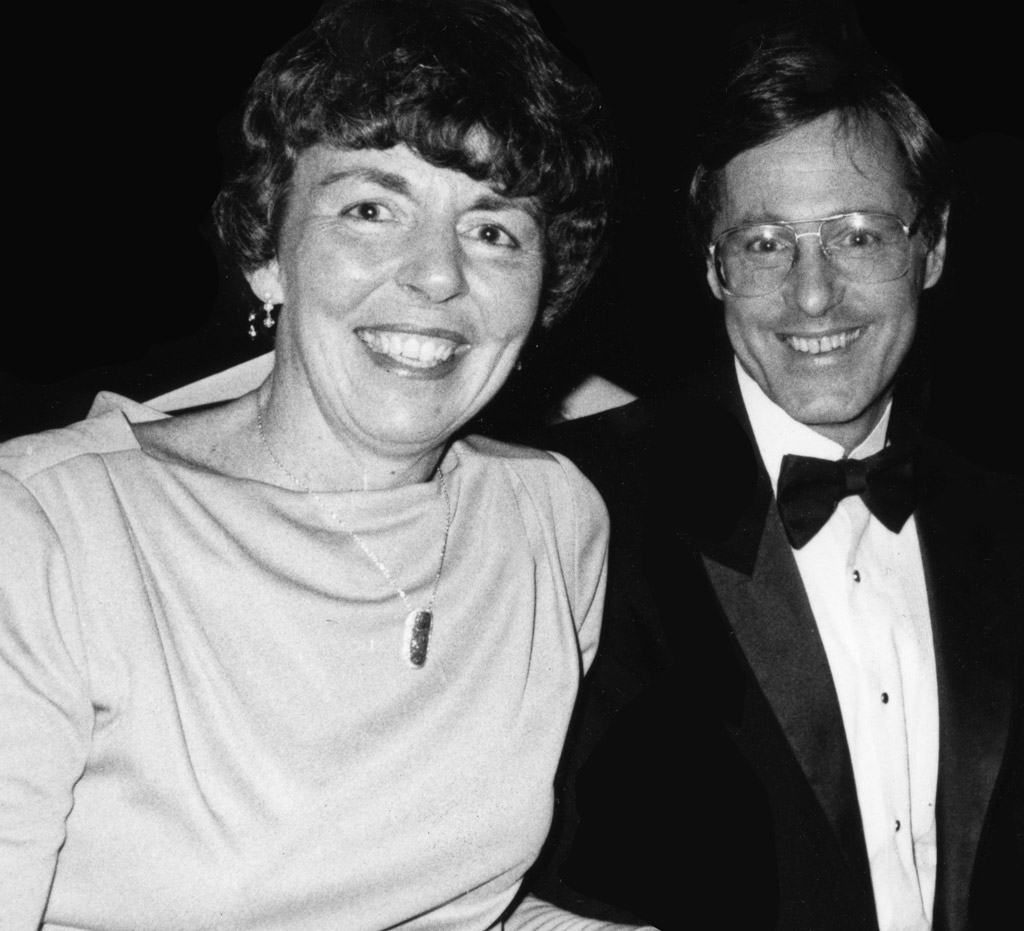 I went back in July of 1958, and here I met my wife, Susan Dudley of South Orange, New Jersey, who had just graduated from the Beard School and was on her way to Wheaton College, in Norton Massachusetts, just 38 miles from Cambridge. We spend the summer at the ranch dating, then dated for a year, went back to the ranch, and dated another year. I adopted her family. I lived with her family. They were everything my family wasn’t. Here I found the order, the stability, the love, the support that a family brings.
I went back in July of 1958, and here I met my wife, Susan Dudley of South Orange, New Jersey, who had just graduated from the Beard School and was on her way to Wheaton College, in Norton Massachusetts, just 38 miles from Cambridge. We spend the summer at the ranch dating, then dated for a year, went back to the ranch, and dated another year. I adopted her family. I lived with her family. They were everything my family wasn’t. Here I found the order, the stability, the love, the support that a family brings.
We were married on August 27, 1960 in Orange, New Jersey, I finished my Ph.D. in English at Harvard in the spring of 1961 and we moved to Lewiston, Maine, where I had my first teaching job at Bates College. Our first son, David Johnson, was born on August 23, 1961, at Boston Lying in Hospital, and our daughter, Carolyn Dean, was born on May 8, 1963 in Lewiston.
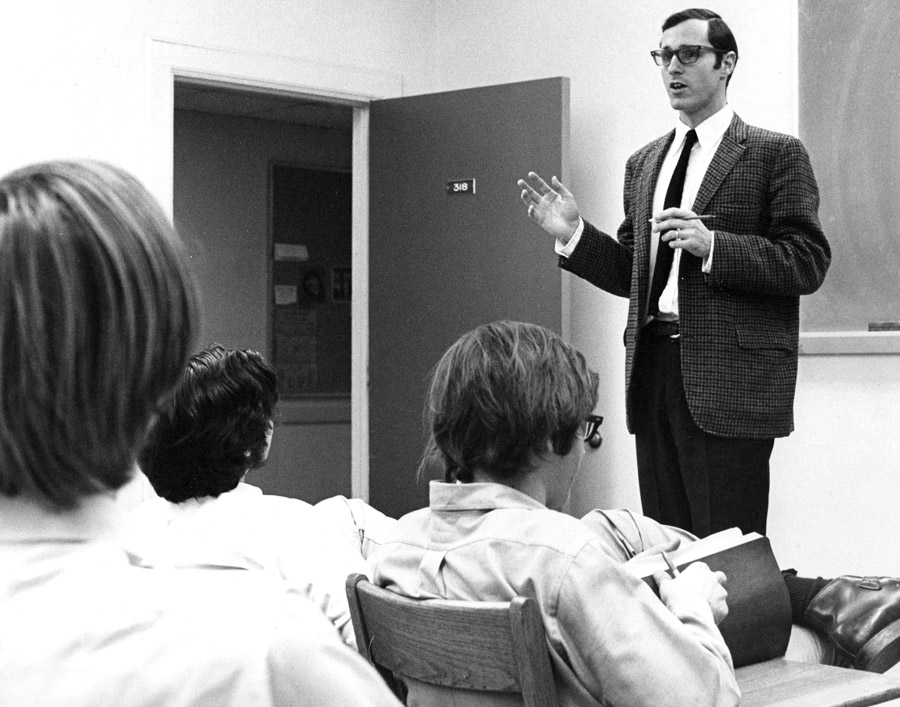 We decided to leave Bates in 1964. We loved the students, but the climate and the overall situation at the college was not appealing to us, and I took a job as Assistant Professor of English at Davidson College in North Carolina.
We decided to leave Bates in 1964. We loved the students, but the climate and the overall situation at the college was not appealing to us, and I took a job as Assistant Professor of English at Davidson College in North Carolina.
Our second son, and third child, Stephen Dudley, was born on October 8, 1964, at Presbyterian Hospital in Charlotte. In 1965, my first book, Shaw and Christianity, a revision of my doctoral thesis at Harvard, was published by Seabury Press.
I loved teaching, my family was flourishing. Davidson seemed like the ideal place for us.
Then, on March 27, 1967, the event happened which changed our lives completely. Our daughter, Lyn, died unexpectedly during the night; it was the Monday after Easter. The autopsy showed a ‘massive swelling of the brain cells’; a form of encephalitis. I had never really dealt with grief before. Raised as I was to ‘be a man’ and take care of myself, I had simply distanced myself from emotional problems, and so I had no real resources for dealing with this tragedy. We went on, and the other children were our greatest blessing, as were the students at the college, and the community in its outpouring of love and support.
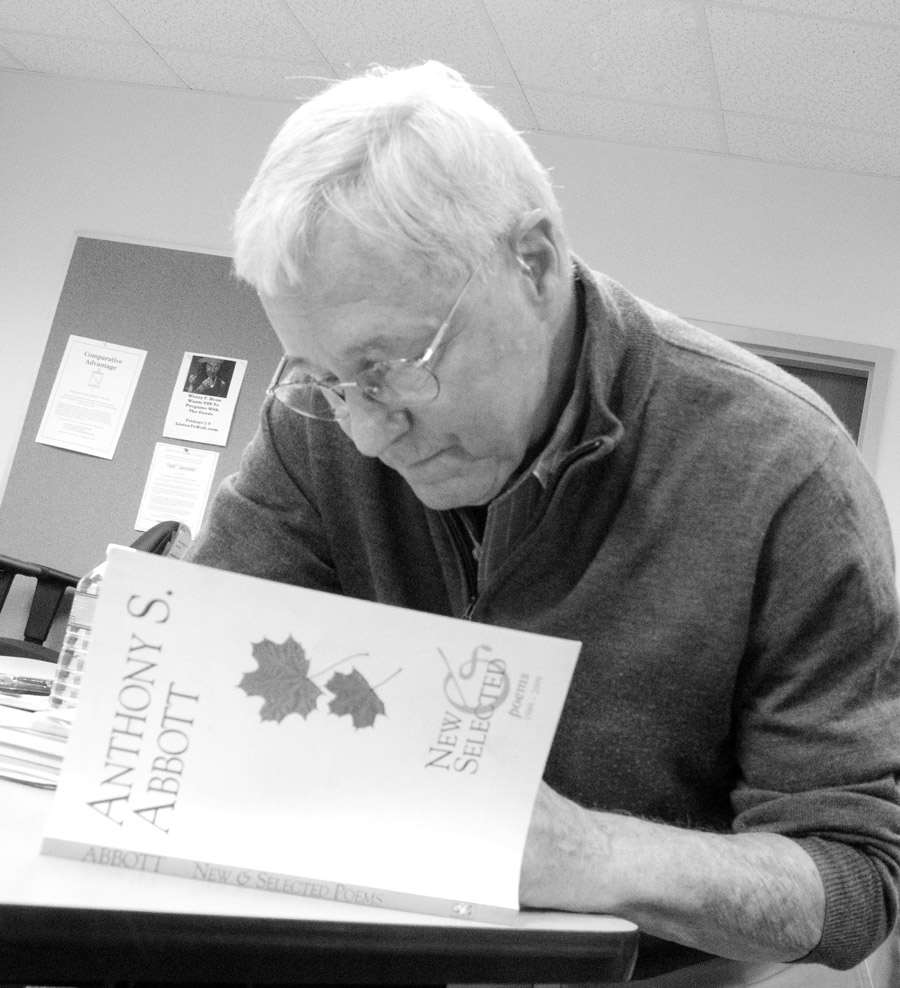 I often measure my beginnings as a poet from this event. I realized that not only had I not allowed myself to grieve for my daughter, but I had never grieved for my mother and grandmother. See especially the poem, “Before Forty” in The Girl in the Yellow Raincoat, which outlines the story. It took me a long time before I was able to cry, able to find words to express all those feelings that lay inside me for years and years. Gradually, slowly, those feelings began to come out in poems; the earliest of them written around 1974 and 1975, many of them in the late ’70’s. In 1978 I was invited to participate in the Bread Loaf Writer’s Conference at Middlebury College as a Scholar in Poetry. I went to Bread Loaf again in 1980. I was now writing poetry with some regularity.
I often measure my beginnings as a poet from this event. I realized that not only had I not allowed myself to grieve for my daughter, but I had never grieved for my mother and grandmother. See especially the poem, “Before Forty” in The Girl in the Yellow Raincoat, which outlines the story. It took me a long time before I was able to cry, able to find words to express all those feelings that lay inside me for years and years. Gradually, slowly, those feelings began to come out in poems; the earliest of them written around 1974 and 1975, many of them in the late ’70’s. In 1978 I was invited to participate in the Bread Loaf Writer’s Conference at Middlebury College as a Scholar in Poetry. I went to Bread Loaf again in 1980. I was now writing poetry with some regularity.
There are a good many poems about Lyn in my four books of poetry; most importantly “Carolyn’s Poem” and “Out of Mourning” in the Yellow Raincoat and “Remembrance” in Small Thing Like a Breath. She also appears in “Point of Light” from The Search for Wonder and “The Man Who Speaks to His Daughter on her 40th Birthday” from The Man Who. I have always thought of her as my muse.
Poetry not only opened up my capacity to have feelings and to grieve for my daughter, but it allowed me to go back and write about other members of my family; my mother, my sister, my father; whom I had in many ways forgotten during my period of marriage and child raising. I was a very active father, deeply involved in the lives of my children.
Our third son, Andrew Halsey, was born on March 1, 1968, and we had a household with three sons, with activities centered on sports, church, music, and drama. But I had ignored my ‘blood’ family, and now I was able to regain a relationship with them. I sent poems to my sister in California, to my father and my aunt in New Jersey. Poems like “Leavings” and “Yesterday, My Father” in Yellow Raincoat are good examples. When my aunt, who had been a tremendous supporter of my work, died in 1989, I wrote “The Legendary Stillness of Herons” in her memory. I also wrote “Artist’s Lives” for her. My first book of poems, The Girl in the Yellow Raincoat, was dedicated to her. She died only months before its publication, and it made me very sad that she was never able to see the book.
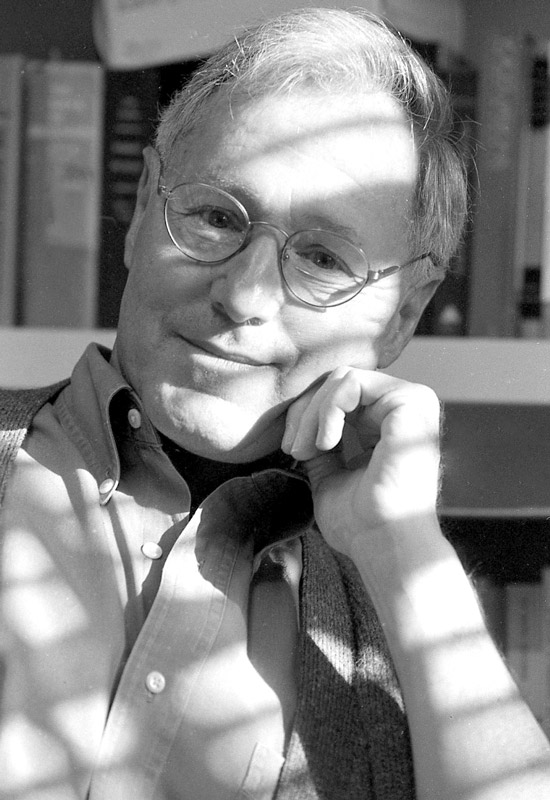 My best work is, I think, elegiac. It memorializes those people who would otherwise be lost unless we find words to keep them alive in our hearts. Poetry, on some level, is about saving things.
My best work is, I think, elegiac. It memorializes those people who would otherwise be lost unless we find words to keep them alive in our hearts. Poetry, on some level, is about saving things.
Even a poem so simple as “Growing Up” in A Small Thing is about saving the wonder of the child in an adult world that conspires to destroy it. Maxine Kumin uses the term ‘Retrieval System’ in one of her great poems. Poetry is a retrieval system. Things die; poetry retrieves them.